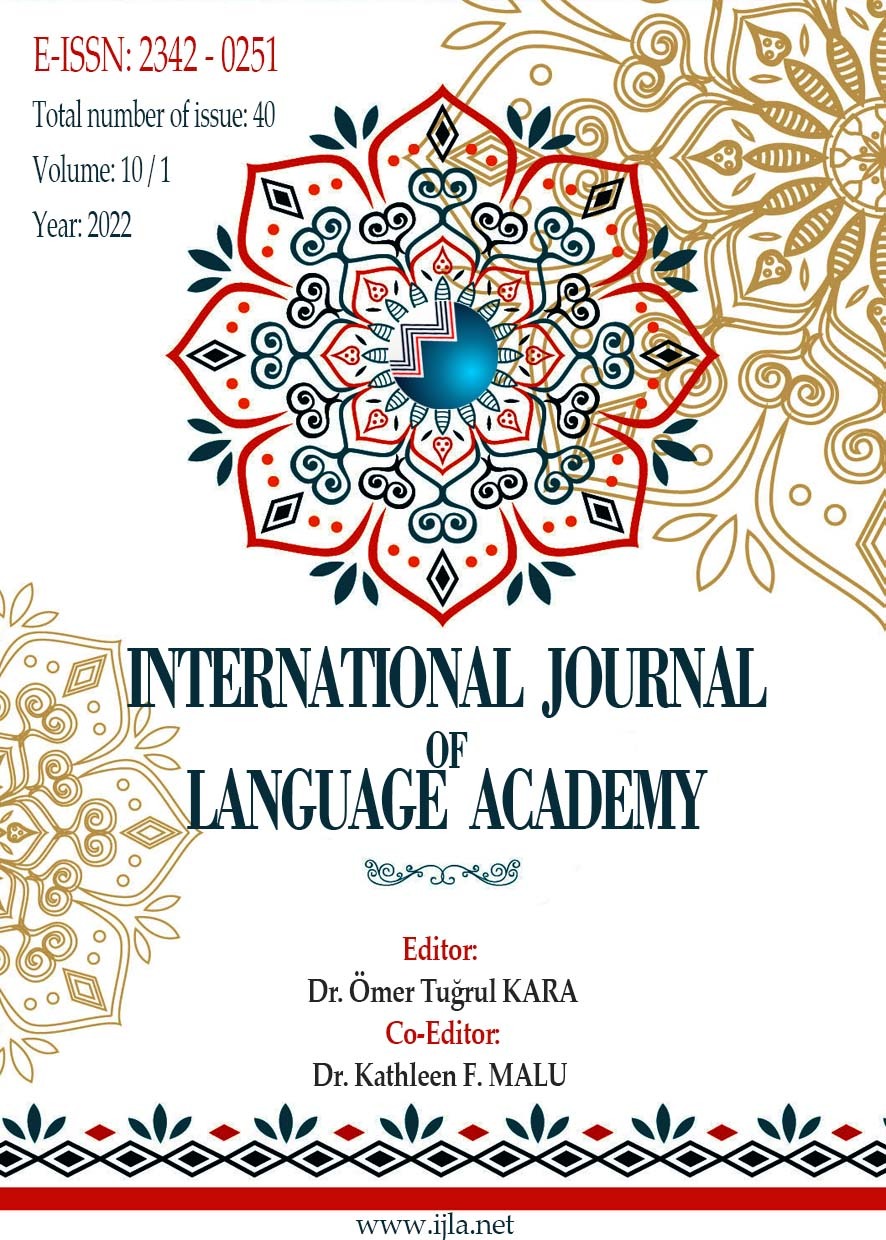Author :
Abstract
Türkçe öğretiminin temel gayesi, bireylere dört temel dil becerisini edindirmek ve bu edinilen becerileri aşamalı olarak geliştirmektir. Konuşma, fiziksel ve zihinsel bir süreç olup birlikte kullanılan sembollerin ve seslerin karşıdaki kişinin zihninde anlam oluşturmasını, iletiye dönüşmesini sağlar. Konuşma becerisi, dört temel dil becerisi içinde dinleme becerisinden sonra kazanılan ikinci temel dil becerisidir. Konuşma becerisi, kişilerin diğer kişilerle iletişim kurmasını, bilgi ve becerilerini karşısındakine aktarmasını ve kendisini daha iyi ve etkili ifade etmesini sağlayan en etkili araçtır. Bireyin kendini ifade edebilmesinde ve iletişiminde konuşma becerisinin önemi büyüktür. Öğrencilerin konuşma becerisi düzeyleri çeşitlilik göstermektedir. Bu düzeyleri en iyi noktaya çıkarmak için Türkçe öğretmenlerinin yaptığı etkinlikler büyük önem arz etmektedir. Bu çalışmanın amacı ortaokul düzeyindeki öğrencilerin konuşma becerisi düzeylerini ve konuşma becerisinin geliştirilmesine yönelik öğretmen görüşlerini belirlemek ve elde edilen bulgular ışığında konuşma eğitiminin daha etkili gerçekleştirilmesine katkı sağlamaktır. Nitel araştırma modelinin kullanıldığı bu çalışmanın örneklemini MEB bünyesinde ve çeşitli özel kurumlarda görev yapan 25 Türkçe öğretmeni oluşturmaktadır. Elde edilen veriler yarı yapılandırılmış görüşme formuyla toplanmıştır. Yarı yapılandırılmış görüşme formuyla toplanan veriler betimsel analiz tekniğiyle incelenmiştir. Çalışmada ortaokul öğrencilerinin konuşma becerisi düzeyleri yetersiz olarak belirlenmiştir. Çalışmada Ortaokul öğrencilerin konuşma becerisi düzeylerinin yetersizliğinin nedenleri olarak ifade etmede zorlanma, öğrencilerdeki isteksizlik ve teşvik yetersizliği olduğu belirlenmiştir. Çalışmada ortaokul öğrencilerinin konuşma becerisi düzeylerinin geliştirilmesi için yapılması gerekenler noktasında önerileri ise yöntem-teknik kullanımına daha çok yer verilmesi, okuma çalışmaları yapılması ve hazırlıklı-hazırlıksız konuşma yaptırılması olarak belirlenmiştir.
Keywords
Abstract
The primary purpose of teaching Turkish is to enable individuals to acquire four basic language skills and develop these acquired skills gradually. Speech is a physical and mental process, and it enables the symbols and sounds used together to create meaning in the mind of the other person and turn them into messages. Speaking is the second essential language skill acquired after listening skills among the four basic language skills. Speaking skill is the most effective tool that enables people to communicate with other people, transfer their knowledge and skills to others, and express themselves better and more effectively. Speaking skill is of great importance in the individual's self-expression and communication. Students' speaking skill levels vary. In order to maximize these levels, the activities of Turkish teachers are of great importance. This study aims to determine the speaking skill levels of secondary school students and teachers' views on the development of speaking skills and contribute to a more effective speech education in light of the findings. The sample of this study, in which the qualitative research model was used, consists of 25 Turkish teachers working in the Ministry of National Education and various private institutions. The obtained data were collected with a semi-structured interview form. The data collected with the semi-structured interview form were analyzed with the descriptive analysis technique. In the study, the speaking skill levels of secondary school students were determined to be insufficient. Finally, the study observed that the reasons for the insufficient level of speaking skills of secondary school students were difficulty in expressing, reluctance in students, and lack of encouragement. In the study, suggestions for what may be done to improve the speaking skill levels of secondary school students were determined as giving more place to the use of method-techniques, reading studies, and making prepared and impromptu speeches.
Keywords
- Akkaya, A. (2012). Öğretmen adaylarının konuşma sorunlarına ilişkin görüşleri. Mustafa Kemal Üniversitesi Sosyal Bilimler Enstitüsü Dergisi, 9(10), 405-420.
- Akyol, H. (2008). Türkçe öğretim yöntemleri. Ankara: Kök Yayıncılık.
- Akyol, H. ve Kırkkılıç, A. (Ed.). (2007). İlköğretimde Türkçe öğretimi. .Ankara: Pegem Akademi.
- Arslan, A. (2012). Üniversite öğrencilerinin topluluk karşısında konuşma ile ilgili çeşitli görüşleri (Ağrı İbrahim Çeçen Üniversitesi örneği). Turkish Studies, 7(3), 221-231.
- Benzer, A. ve Ünsal, F. (2019). Konuşma öğretiminin program ve ders kitabı ekseninde uygulamaya yansıması. Ana Dili Eğitimi Dergisi, 7(3), 647-662.
- Demirel, Ö., ve Şahinel, M. (2006). Türkçe ve sınıf öğretmenleri için Türkçe öğretimi. Ankara: Pegem A Yayıncılık.
- Doğan, Y. (2009). Konuşma becerisinin geliştirilmesine yönelik etkinlik önerileri. Türk Eğitim Bilimleri Dergisi, 7(1), 185-204.
- Erdem, İ. (2015). İletişim sürecinde konuşma becerisi. Ankara: Pegem Akademi.
- Gündüz, O. ve Şimşek, T. (2014). Anlatma teknikleri-2: uygulamalı konuşma eğitimi. Ankara: Grafiker Yayınları.
- Güneş, F. (2020). Türkçe öğretimi yaklaşımlar ve modeller. Ankara: Pegem Akademi.
- Işık, R. ve Erdem, İ. (2016). Türkçe öğretiminde karşılaşılan sorunların öğretmen görüşlerine göre belirlenmesi (Muş ili örneği). Turkish Studies. 11(3), 1309-1332.
- Karakoç Öztürk, B. ve Altuntaş, İ. (2012). İlköğretim ikinci kademede konuşma eğitimine yönelik öğretmen görüşleri: Nitel Bir Çalışma. Eğitim ve Öğretim Araştırmaları Dergisi.1(2), 342-356.
- Kurudayıoğlu, M. (2003). Konuşma eğitimi ve konuşma becerisini geliştirmeye yönelik etkinlikler. Türklük Bilimi Araştırmaları, 13, 287-309.
- Marshall, J. (1994). Ana dili ve yazın öğretimi. (C. Külebi, Çev.). Ankara: Başak Yayıncılık.
- MEB. (2018). Türkçe dersi (1, 2, 3, 4, 5, 6, 7, 8. sınıflar) öğretim programı. Ankara: MEB.
- Richards, J. S. (2003). Current trends in teaching listening and speaking. The Language Teacher.
- Shrum, J. L., ve Glisan, E. W. (2000). Teacher's handbook: contextualized language instruction. Boston, Mass.: Heinle & Heinle.
- Şen, F. ve Topçuoğlu Ünal, F. (2021). Türkçe öğretmenlerinin uzaktan eğitimdeki konuşma becerisinde karşılaştıkları sorunlar. Route Educational & Social Science Journal.8(6), 139-152.
- Temizkan, M. (2009). Akran değerlendirmenin konuşma becerisinin geliştirilmesi üzerindeki etkisi. Mustafa Kemal Üniversitesi Sosyal Bilimler Enstitüsü Dergisi, 6(12), 90-112.
- Topçuoğlu Ünal, F. (Ed.). (2019). Türkçe öğrenme ve öğretim yaklaşımları. Ankara: Nobel Yayınları.
- Topçuoğlu Ünal, F. ve Degeç, H. (2012).Öğretmen görüşlerine göre konuşma eğitiminde karşılaşılan sorunlar. The Journal of Academic Science Studies. 5(7):735-750.
- Uçgun, D. (2007). Konuşma eğitimini etkileyen faktörler. Erciyes Üniversitesi Sosyal Bilimler Enstitüsü Dergisi, 22(1), 59-67.
- Ur, P. (1992). A course in language teaching. England: Cambridge University Press.
- Yıldırım, A. ve Şimşek, H. (2018). Sosyal bilimlerde nitel araştırma yöntemleri. Ankara: Seçkin Yayıncılık.
- Yıldız, C., Okur, A., Arı, G. ve Yılmaz, Y. (2013). Yeni programa göre kuramdan uygulamaya Türkçe öğretimi. Ankara: Pegem Akademi.
- Yılmaz, K. ve Arık, S. R. (Ed.). (2019). Eğitimde araştırma yöntemleri. Ankara: Pegem





